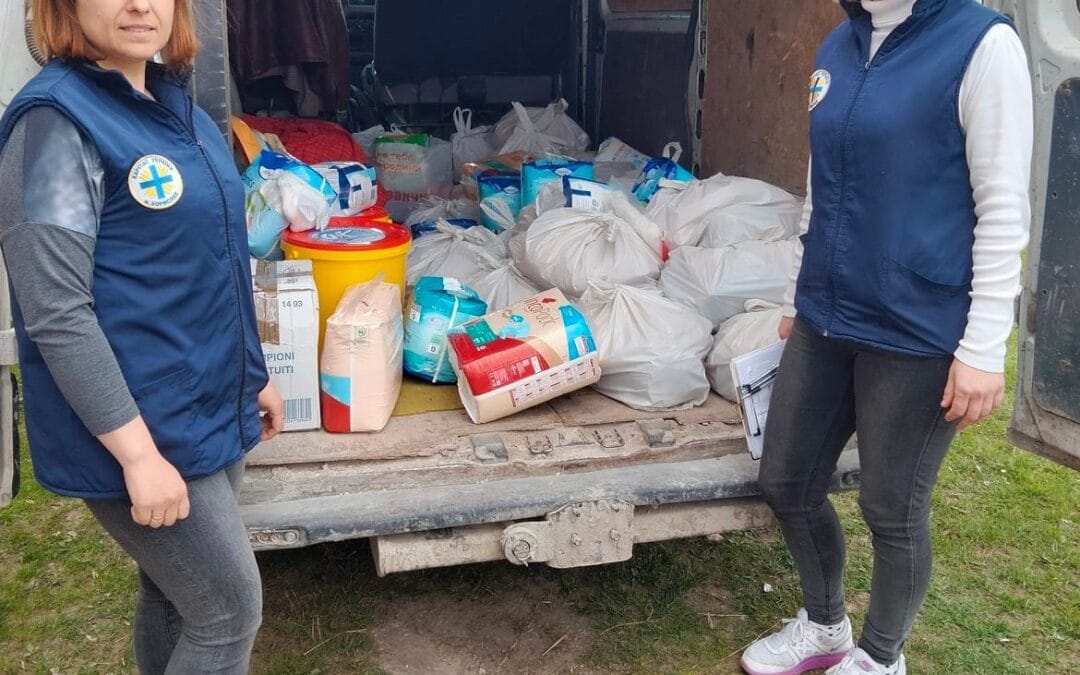
26 Feb 2022 | Centro internazionale, Emergencies, Focolari nel Mondo
The contributions, collected through the NGOs Azione per un Mondo Unito (AMU) and Azione per Famiglie Nuove (AFN), will be used to provide the people of Ukraine with basic necessities, in collaboration with local Churches.
The Emergency Coordination Team of the Focolare Movement has launched a special fundraising campaign to support the people of Ukraine through the NGOs Azione per un Mondo Unito (AMU) and Azione per Famiglie Nuove (AFN).
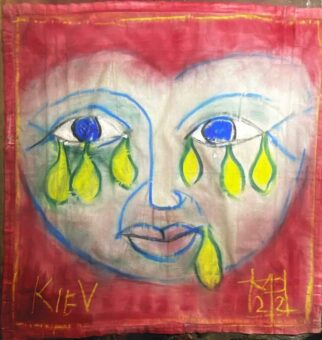
“Kiev” by the painter Michel Pochet
Any donations received will be managed jointly by AMU and AFN to provide essential aid to the Ukrainian people for food, medical care, housing, heating and shelter in various Ukrainian cities, in collaboration with local Churches. Donations can be made online via the following sites: AMU: www.amu-it.eu/dona-online-3/ AFN: www.afnonlus.org/dona/ or by bank transfer to the following accounts:
Azione per un Mondo Unito ETS (AMU) IBAN: IT 58 S 05018 03200 000011204344 at Banca Popolare Etica Codice SWIFT/BIC: ETICIT22XXX
Azione per Famiglie Nuove ETS (AFN) | Banca Etica – filiale 1 di Roma – Agenzia n. 0 | Codice IBAN: IT 92 J 05018 03200 000016978561 | BIC/SWIFT: ETICIT22XXX
Reason for donation: Ukraine Emergency
Tax benefits are available for such donations in many EU countries and in other countries around the world, according to different local regulations. Italian contributors will be able to obtain deductions and allowances from income, according to the rules for non-profit organisations (more…)
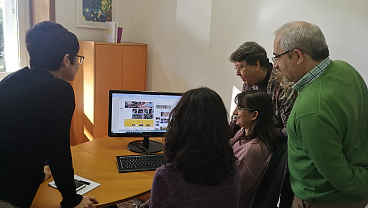
23 Nov 2018 | Cultura, Focolari nel Mondo, Non categorizzato, Spiritualità
 Innovation is on the horizon for focolare.org users. The Focolare website will soon appear in a restyled format and with additional navigational features. This is a project which the International Centre of the Focolare Movement in Rocca di Papa (Rome) has been developing over the last two years. The project aims at integrating the communication networks, carried out up till now by four separate publishing sectors (Website, Information Service, Mariapolis Newsletter, and Collegamento CH Worldwide Linkup), thus creating a unified “Communications Office”. Already operating since last February, this Office gathers news about the life of the Movement worldwide and transmits them through various media. Among its main objectives is to promote activities of the Focolare Movement, to communicate its life to a broader audience, and to contribute to a greater sharing of news among the various Focolare communities worldwide. The development of new communication technologies and trends called for the restyling of the website which includes a new graphic layout, significantly more minimalist in structure, and an upgraded navigational logic. The use of new applications will also allow for greater integration with the social media, and will enable users to access content in different and personalized modes. The new structure will, in fact, be mobile-friendly and as such will take into account the use of smartphones and other mobile technology in our daily life. It will focus on content that is brief and varied, available in different formats (text messages, infographics, video clips, etc). The contents of the current site, however, will not be lost. The static content will be published as an e-Book and in the future the news articles will be accessible through searchable archives. Also envisaged is a space, entitled “Mariapolis”, dedicated to news regarding many aspects of the life of the Focolare Movement. It bears the same name given to the traditional summer gatherings of the Focolare held around the world. The current print edition of the journal “Mariapolis” will be discontinued after December 2018. The digital version aims to be a virtual “community” open to anyone who wants to visit. A system of notifications will allow the users to choose when, which themes and channels, and the preferred device (PC, tablet or smartphone) they would like to receive the information on. Every two months, a “Mariapolis” newsletter in pdf format will deliver a summary of the main highlights. Happy surfing! Joachim Schwind
Innovation is on the horizon for focolare.org users. The Focolare website will soon appear in a restyled format and with additional navigational features. This is a project which the International Centre of the Focolare Movement in Rocca di Papa (Rome) has been developing over the last two years. The project aims at integrating the communication networks, carried out up till now by four separate publishing sectors (Website, Information Service, Mariapolis Newsletter, and Collegamento CH Worldwide Linkup), thus creating a unified “Communications Office”. Already operating since last February, this Office gathers news about the life of the Movement worldwide and transmits them through various media. Among its main objectives is to promote activities of the Focolare Movement, to communicate its life to a broader audience, and to contribute to a greater sharing of news among the various Focolare communities worldwide. The development of new communication technologies and trends called for the restyling of the website which includes a new graphic layout, significantly more minimalist in structure, and an upgraded navigational logic. The use of new applications will also allow for greater integration with the social media, and will enable users to access content in different and personalized modes. The new structure will, in fact, be mobile-friendly and as such will take into account the use of smartphones and other mobile technology in our daily life. It will focus on content that is brief and varied, available in different formats (text messages, infographics, video clips, etc). The contents of the current site, however, will not be lost. The static content will be published as an e-Book and in the future the news articles will be accessible through searchable archives. Also envisaged is a space, entitled “Mariapolis”, dedicated to news regarding many aspects of the life of the Focolare Movement. It bears the same name given to the traditional summer gatherings of the Focolare held around the world. The current print edition of the journal “Mariapolis” will be discontinued after December 2018. The digital version aims to be a virtual “community” open to anyone who wants to visit. A system of notifications will allow the users to choose when, which themes and channels, and the preferred device (PC, tablet or smartphone) they would like to receive the information on. Every two months, a “Mariapolis” newsletter in pdf format will deliver a summary of the main highlights. Happy surfing! Joachim Schwind
1 Nov 2017 | Focolari nel Mondo
https://www.focolare.org/gb/files/2017/10/201711WOL.mp3 (more…)
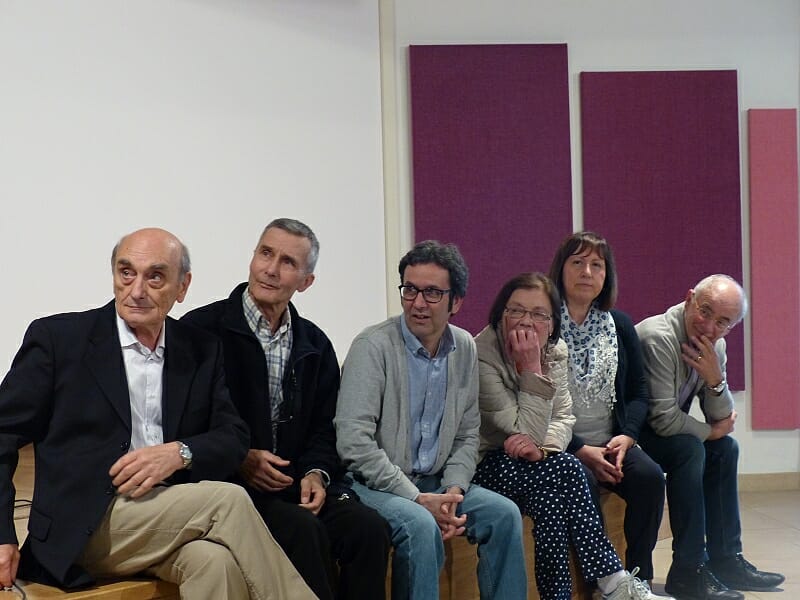
23 May 2015 | Chiara Lubich, Cultura, Focolari nel Mondo, Non categorizzato, Spiritualità
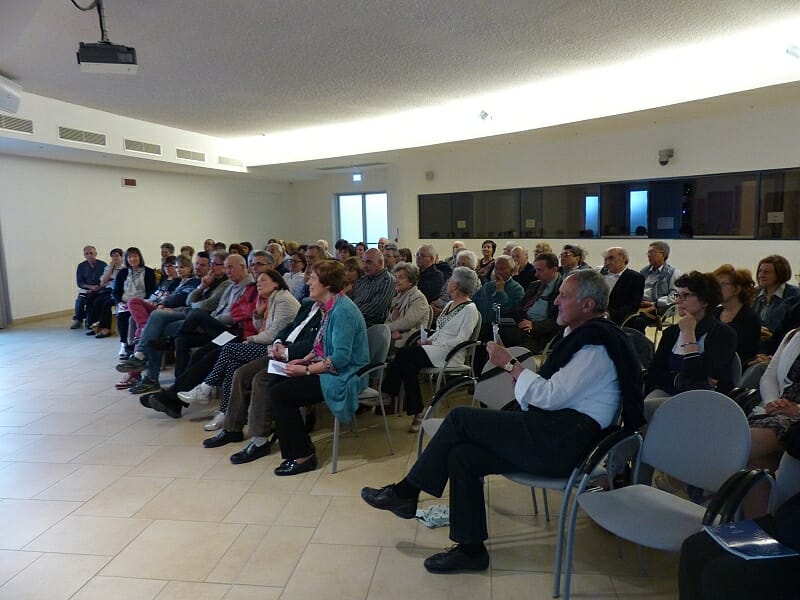 It was the evening of 7 May 1995 at the international Centre in Loppiano (Italy). A group of people of various beliefs and cultural backgrounds were having a lively discussion at dinner. They had spent the entire day together to see whether they, as Catholics and agnostics, could overcome ideological limits, dislikes and century-old prejudices and get to understand, accept and appreciate one another. These gatherings of people who spoke different languages and professed various beliefs had started already in 1978 when Chiara Lubich, founder of the Focolare Movement, set up the “Centre for Dialogue with People who hold No Religious Affiliations” within the scope of a more extensive experience initiated by the Focolare. The 7 May 2015 meeting in Loppiano was taken as an opportunity to take stock of this reality and a challenge to certify, face to face, if mutual esteem is really possible. Over the years, in fact, all have even become “friends,” and getting together and discussing with one another was considered not only stimulating but also very pleasant. At that dinner, however, someone was missing, one who perhaps was the most active in the group: Ugo Radica. This really special focolarino had decided to pursue an idea without notifying anybody and had gone to station himself close to the house of Chiara Lubich, founder of the Movement, who was supposed to arrive in Loppiano that evening. His patience was rewarded in the end when Chiara’s car finally came into view. Ugo approached the car, and Chiara, quite surprised, lowered the window to ask: «What are you doing here, Ugo? He firmly said: “I’m here with a group of friends of different beliefs. Why don’t you come to see us tomorrow? I think it would be very important for them to have an exchange of ideas with you personally.” Chiara accepted though unsure and a bit doubtful. She requested that the group prepare some questions for her to answer. Ugo thus returned to the group full of enthusiasm.
It was the evening of 7 May 1995 at the international Centre in Loppiano (Italy). A group of people of various beliefs and cultural backgrounds were having a lively discussion at dinner. They had spent the entire day together to see whether they, as Catholics and agnostics, could overcome ideological limits, dislikes and century-old prejudices and get to understand, accept and appreciate one another. These gatherings of people who spoke different languages and professed various beliefs had started already in 1978 when Chiara Lubich, founder of the Focolare Movement, set up the “Centre for Dialogue with People who hold No Religious Affiliations” within the scope of a more extensive experience initiated by the Focolare. The 7 May 2015 meeting in Loppiano was taken as an opportunity to take stock of this reality and a challenge to certify, face to face, if mutual esteem is really possible. Over the years, in fact, all have even become “friends,” and getting together and discussing with one another was considered not only stimulating but also very pleasant. At that dinner, however, someone was missing, one who perhaps was the most active in the group: Ugo Radica. This really special focolarino had decided to pursue an idea without notifying anybody and had gone to station himself close to the house of Chiara Lubich, founder of the Movement, who was supposed to arrive in Loppiano that evening. His patience was rewarded in the end when Chiara’s car finally came into view. Ugo approached the car, and Chiara, quite surprised, lowered the window to ask: «What are you doing here, Ugo? He firmly said: “I’m here with a group of friends of different beliefs. Why don’t you come to see us tomorrow? I think it would be very important for them to have an exchange of ideas with you personally.” Chiara accepted though unsure and a bit doubtful. She requested that the group prepare some questions for her to answer. Ugo thus returned to the group full of enthusiasm.
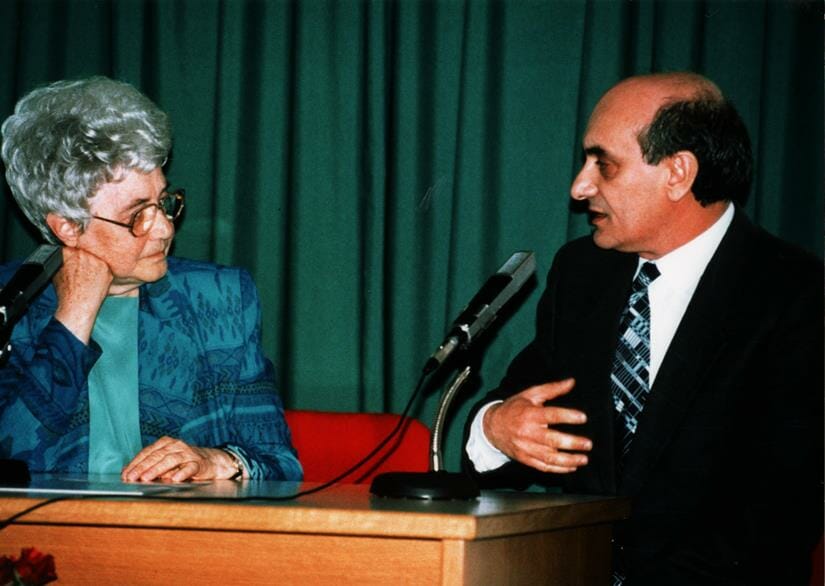
Chiara Lubich meets with the group in Loppiano, 7 May 1995
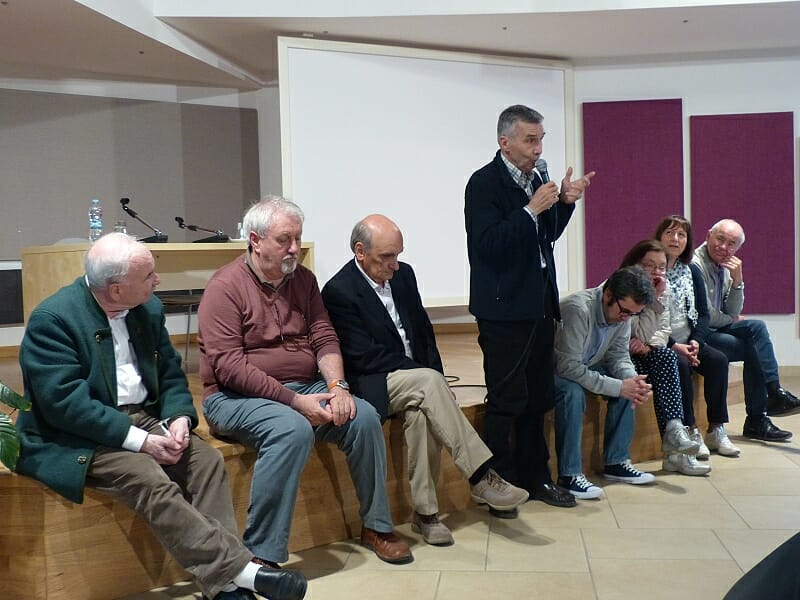 That evening, Tito, one of the friends who had turned up by chance at the last minute, phoned his wife, a genuine Catholic, and a long-time member of the Movement, to proudly announce to her that he had spoken to Chiara personally, while she in all those years still had not seen or had a glimpse of her even from afar.
That evening, Tito, one of the friends who had turned up by chance at the last minute, phoned his wife, a genuine Catholic, and a long-time member of the Movement, to proudly announce to her that he had spoken to Chiara personally, while she in all those years still had not seen or had a glimpse of her even from afar.  Twenty years later, on 7 May 2015 there was again a celebration in Loppiano. A nostalgic commemoration? Absolutely not. Armando, Morena, Tito, Dolores, Piero, Luciana, Roberto, Silvano and many more followed one another onstage to recall those moments, not only to assess the 20 years that have passed, but to also organize the next events. They are convinced, more than ever, of the importance of this type of dialogue. And unlike the moments of encounters between believers, one never knows how these “fourth dialogue” meetings can turn out. But precisely this fact is a warranty of authenticity, since each inevitably has to be fully and personally involved, ready to offer one’s ideas but also accept those of others through an intricate but fruitful exchange. This dialogue which has continued through the years, not without difficulties, has become international, and has reached many countries. Its diffusion and urgency was strongly felt as a pressing responsibility by those who attended the 2015 gathering. This lifestyle has to be actualised firstly among the members of the Movement, to be offered in turn, to all of humanity.
Twenty years later, on 7 May 2015 there was again a celebration in Loppiano. A nostalgic commemoration? Absolutely not. Armando, Morena, Tito, Dolores, Piero, Luciana, Roberto, Silvano and many more followed one another onstage to recall those moments, not only to assess the 20 years that have passed, but to also organize the next events. They are convinced, more than ever, of the importance of this type of dialogue. And unlike the moments of encounters between believers, one never knows how these “fourth dialogue” meetings can turn out. But precisely this fact is a warranty of authenticity, since each inevitably has to be fully and personally involved, ready to offer one’s ideas but also accept those of others through an intricate but fruitful exchange. This dialogue which has continued through the years, not without difficulties, has become international, and has reached many countries. Its diffusion and urgency was strongly felt as a pressing responsibility by those who attended the 2015 gathering. This lifestyle has to be actualised firstly among the members of the Movement, to be offered in turn, to all of humanity.
![From Congo to Belgium, the journey of Belamy]()
18 Dec 2013 | Cultura, Focolare Worldwide, Focolari nel Mondo, Nuove Generazioni

Clip video- http://www.youtube.com/watch?v=ymXHLfOal4U

Belamy Paluku
3 Oct 2013 | Focolari nel Mondo
“Owe no one anything, except to love one another; for the one who loves another has fulfilled the law” (Rom. 13:8). (more…)









